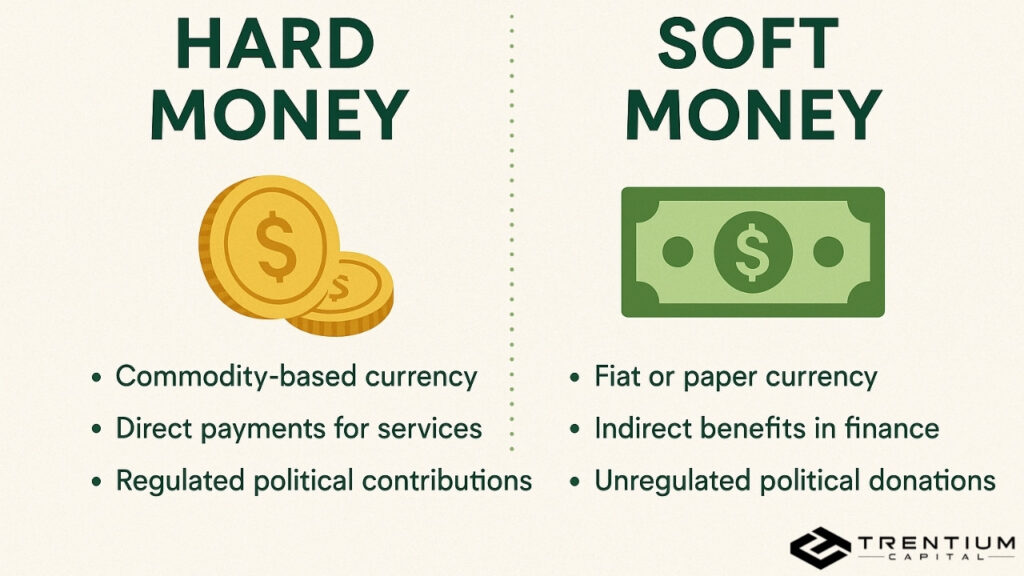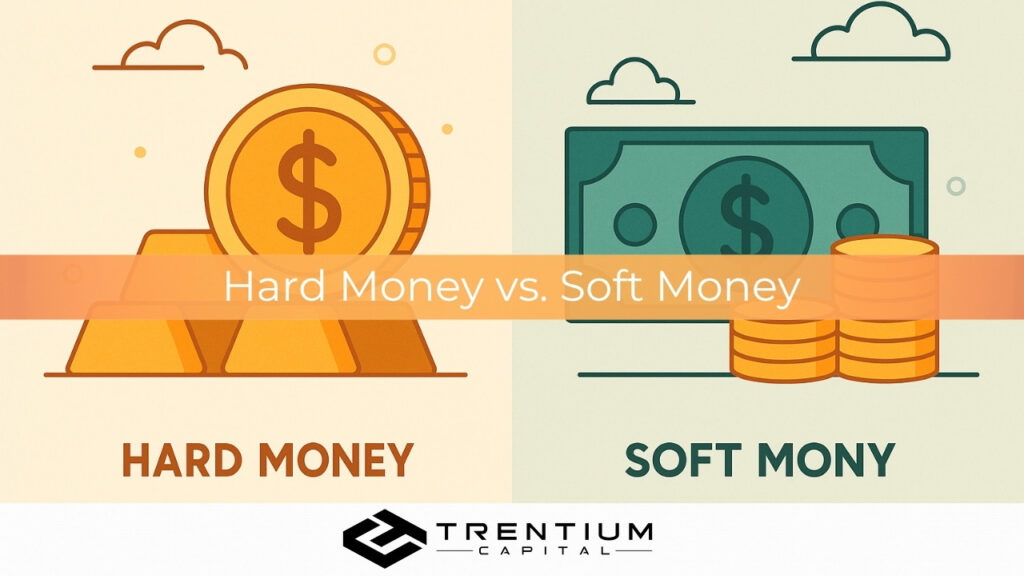In a world driven by financial flows, political influence, and rapid real estate development, understanding the nuances of hard money vs. soft money isn’t just academic; it’s practical. While seemingly simple, these terms cut across multiple disciplines, including economics, finance, campaign politics, and property investment. And in each field, the stakes are different, but the impact is real.
Are you an investor seeking short-term real estate funding or a citizen concerned about campaign financing? This guide is your one-stop shop for a deep dive into the multifaceted world of hard and soft money.
1. Hard vs. Soft Money in Economics
Economically, the concept of hard money harks back to the gold and silver standards. Historically, hard money refers to a currency backed by tangible assets like gold, meaning it has intrinsic value and a limited supply.
On the other hand, soft money is fiat currency,government-issued notes with no inherent value other than trust and legal backing. Most countries today, including the U.S., operate on a fiat system due to its flexibility.
Benefits of Hard Money in Economics:
- Preserves value over time
- Resists inflation and reckless government printing
- Encourages disciplined fiscal policy
Risks of Soft Money:
- Vulnerable to inflation
- It relies entirely on economic confidence and government control.
2. Hard vs. Soft Money in Finance
The terms are used in different contexts in the financial services industry. Hard money refers to transparent, direct payments like brokerage commissions or fixed consulting fees.
Soft money, by contrast, involves indirect compensation such as free research, discounted tools, or marketing support, typically offered in exchange for trading volume or assets under management.
While legal, these soft arrangements often lack transparency and can create conflicts of interest between advisors and clients. Soft money practices are usually hidden from clients and may be viewed as unethical if not appropriately disclosed.

3. Hard vs. Soft Money in U.S. Politics
Political finance is where these terms are most widely recognized and misunderstood. In the U.S., hard money refers to political contributions made directly to a candidate, with strict limits and regulatory oversight by the Federal Election Commission (FEC).
Conversely, soft money consists of unregulated donations to parties or Political Action Committees (PACs) used for general “party-building” activities like voter registration drives or legislative advocacy.
According to OpenSecrets.org, Super PACs raised over $3.1 billion in soft money during the 2020 election cycle, a sharp rise from previous years. This highlights the growing role of unregulated donations in modern politics.
4. Hard Money in Real Estate: What You Should Know
Hard money loans are crucial for real estate investors, developers, and property flippers. They are asset-backed, short-term loans provided by private lenders or specialized firms like Trentium Capital.
They differ from conventional bank loans in speed, requirements, and flexibility. Where banks demand long credit checks and income proofs, hard money lenders prioritize the property’s value.
Ideal Use Cases:
- Construction loans
- Fix and flip projects
- Bridge loans during real estate transitions
Key Features:
- Funding in as little as 3–5 business days
- Interest rates range from 8% to 15%
- Terms typically span 6 to 24 months
Hard Money vs Soft Money Comparison
| Aspect | Hard Money | Soft Money |
|---|---|---|
| Economics | Backed by precious metals (gold/silver) | Fiat currency issued by governments |
| Finance | Direct, disclosed payments for services | Indirect or bundled benefits, often undisclosed |
| Politics | Regulated, candidate-specific contributions | Unregulated donations to parties or PACs |
| Real Estate | Secured short-term property loans | Not typically used in real estate |
| Transparency | High | Often low or ambiguous |
| Regulation | Governed by strict laws (e.g., FEC in politics) | Loopholes exist, less oversight |
FAQs
1. What’s the difference between hard and soft money in politics?
Hard money is regulated and given directly to candidates; soft money is unregulated and typically used for party-building or advocacy.
2. Why are hard money loans popular in real estate?
They offer fast funding and fewer credit restrictions, making them ideal for time-sensitive investments like flips or bridge financing.
3. Can soft money be used in real estate?
Not typically. Soft money usually refers to non-monetary compensation rather than real estate loans.
4. Is hard money better for inflation protection?
Yes. In economics, hard money (like gold-backed currency) resists inflation better than fiat money.
5. Are soft money contributions legal in politics?
Yes, but with restrictions, they cannot be coordinated with candidates and must be used for general advocacy or party-building.
Why Choose Trentium Capital for Hard Money Loans?
Whether flipping property in record time or securing funds for a construction site that can’t wait, Trentium Capital provides the financial muscle and flexibility you need to execute.
We Specialize In:
- Fix and Flip Loans
- Construction Loans
- Bridge Loans
Ready to start your next project?
Contact Trentium Capital now and secure your custom loan solution today.
Final Thoughts
From monetary policy to political influence to property investment, hard and soft money play different but powerful roles. In some cases, you want the freedom and flexibility of soft money. In others, especially real estate, hard cash is the smart, fast, and secure choice.



